
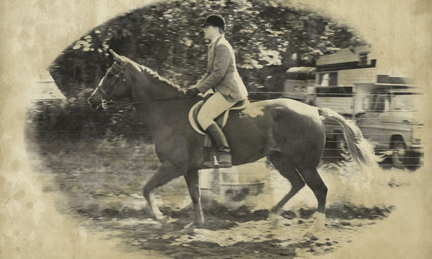
Today, Lisa is a member of the State Line Tack marketing team where she uses her equine industry knowledge to help State Line Tack connect with organizations who also want to support the equine community through experiences and education. National 4‑H Council is the newest organization to partner with State Line Tack, inspiring kids to jump to new heights through the partnership.
While there’s a clear connection between 4‑H and State Line Tack, Lisa connects with 4‑H on a more personal level.
She is a 4‑H Alumna.
Lisa’s parents immigrated to the United States from Denmark in the mid 1950s. In 1969, at the age of 8, Lisa was introduced to 4‑H. As her 4‑H experience began in Bellevue, Washington, she discovered what she truly loved – horses.
“[My mom] realized that 4‑H was a very American thing,” Lisa explained. “And 4‑H to her was the equivalent of what your child can do from start to finish.”
Like her mother, who grew up on a dairy farm, Lisa also understood the importance of valuing all animals, thanks in part to 4‑H. Because of the values learned in 4‑H, her mother spent what Lisa describes as “thousands and thousands of hours” driving her back and forth to 4‑H club meetings, events, and shows.
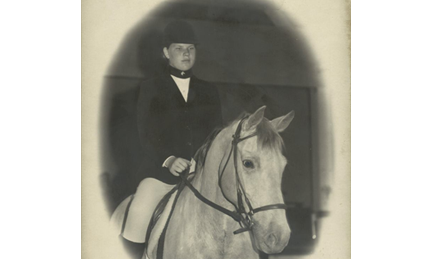
“We learned to rely on each other,” she recalls. “Even though we competed against each other, we rooted for each other, and we were always friends at the end.”
When remembering the friends she made, the skills she learned, and the opportunities she was fortunate enough to have, she stresses that those experiences would not have been possible without family.
“Without our parents, our family members, or whoever it is that’s taking us everywhere, it wouldn’t happen. I think we really need to acknowledge the fact that they helped us,” she says.
Because of the help she received, plus her 4‑H experience, Lisa went on to study International Business at Washington State University, traveled the world, and today, helps State Line Tack become a leader in equine supplies and education for all ages in all communities.
Through the 4‑H and State Line Tack partnership, Lisa hopes to create a local impact and help raise more awareness of 4‑H programs in communities where 4‑H may not be prevalent. Additionally, she wants more kids to experience what 4‑H has to offer, whether through equine programs, other livestock learning, and more.
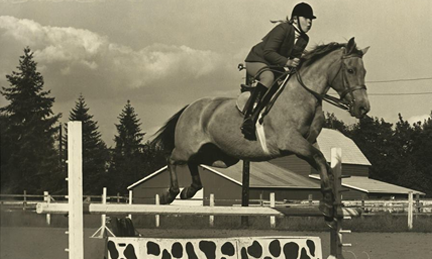
Lisa credits 4‑H with teaching her so many of the valuable professional skills she still uses today including organization, presentations and time management. On a personal level, Lisa raises and shows Shetland ponies, and her first homebred world champion is now being well cared for and loved by a young 4‑H’er in Indiana.
State Line Tack is a proud supporter of 4‑H’ers across America. National partners like State Line Tack help fund local equine programs and support National 4‑H Council’s mission to grow 4‑H from 6 million to 10 million kids across the country. Learn more about our partnership.
DH: 4‑H was very instrumental in molding me into who I am today. My interest in many things started at home; however, 4‑H was where I learned more, and it helped me build my confidence to participate in the many projects. It helped me build the confidence to become a leader, first by participating at the local level, then to participate at the state level. 4‑H helped me to find what my interests were and to grow those interests. It helped me become who I am today. I can say that without 4‑H, I never would have had the confidence to speak before a group. It was the start of a passion I have today, and that is to educate youth and adults about how their food is grown.
Are you still involved with 4‑H now?
DH: I am still involved with 4‑H today. I don’t know if there was a time that I wasn’t involved in 4‑H in some form. I was heavily involved while my children were growing up through 4‑H. Later, assisted the 4‑H agents whenever they needed help after they graduated because my youngest never stopped working with 4‑H’ers either. I then formed a non-profit, the Fast Food Farm, where I work with 4‑H’ers and FFA students. The goals of the Fast Food Farm are: to educate consumers of all ages about how their food is grown; create innovative educational materials to which teachers and students can relate; teach the importance of agriculture to our daily lives and to the economy; provide mentoring opportunities for all students; and provide leadership opportunities for 4‑H, FFA, and Pro-Start students. The students are trained to be peer teachers for the two large events we have at the farm each year. I serve on the St. James Parish 4‑H Foundation Board, as well as the Louisiana 4‑H Foundation Board.
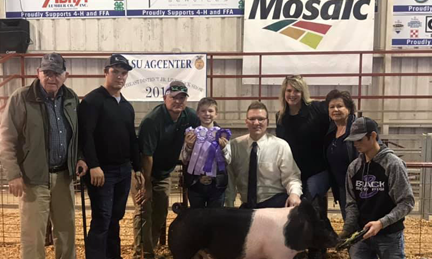
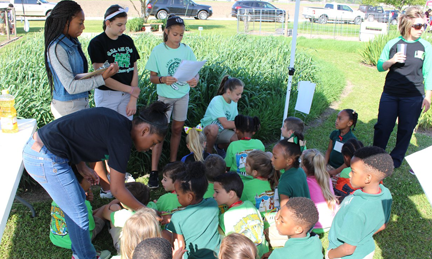
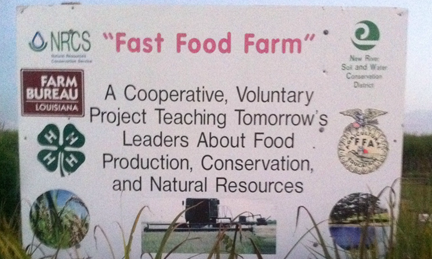
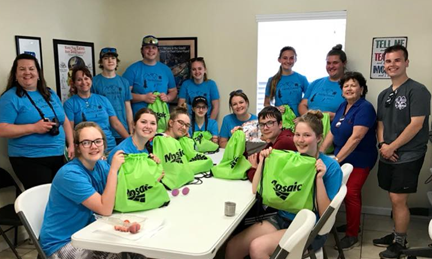
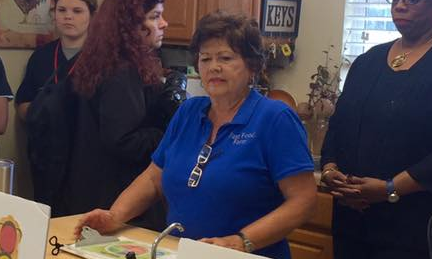
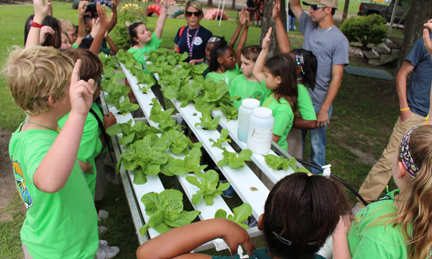
I wouldn’t be who I am today without 4‑H. Growing up, I was a very shy young person. I wouldn’t ever dream about speaking to new people or in front of a crowd (unless it was a nightmare) until I joined 4‑H. I had an amazing 4‑H agent who encouraged me to join the horseless horse club to learn more about horses. The club also helped me work through my fear of horses due to a traumatic experience when I was a young child. I loved it so much, and it eventually helped me work through my fears and start riding horses again. That then started my mom to become a local 4‑H Horse leader for our valley. I was able to be a leader and start learning how to run meetings and encourage the younger members to be involved and engaged. I loved working with youth and agents from across the state, which helped me network and has helped me throughout my career. I also loved working with the younger kids in a camp setting, which cemented that I knew I wanted to work with youth no matter what in my future careers. The life lessons learned in 4‑H have helped in my life, and I love being able to pass on those life skills to my children. I am so thankful for the many opportunities and doors it opened up for me.
Like many of my peers, agriculture is in my blood, and 4‑H was the first organized outlet to meet others with similar interests and begin sharpening my skills. I have fond memories of Red Ranger club meetings where the adults truly let us become leaders and run a meeting. It also provided unique outings and taught me how to speak in front of a group through demonstrations. It was also something we did as a family. Meetings took place in our basement, and we worked together to finish projects, prep pigs for the show ring, and traveled 2.5 hours to the state fair to present award-winning rice crispy treats. 4‑H offered an outlet to express yourself through any interest. Today, I try to be a spokesman for agriculture at all levels. I remember some of my first experiences with the media were being at the Fair representing 4‑H. As an adult, I have been asked to do national media interviews and work directly with consumers and legislators.
I was raised in a very rural community. Growing up, 4‑H provided me opportunities to meet people outside of my community and experience different cultures. I also participated in leadership, citizenship, and community service activities that taught me the values of ethics, fairness, hard work, and commitment. My fair animal projects helped me save money to pay for my college education and establish a partnership with my dad buying and selling feeder cattle. Many of my memories growing up involve some type of 4‑H activity. I owe many of the skills that I have today to my time in 4‑H. As a nurse practitioner, I have to be able to multitask, think critically, and make strong decisions, sometimes very quickly, while having compassion, good listening skills, organization, and documentation skills. As a member of several director’s boards, I use meeting organization skills, parliamentary procedure, group organization, leadership, and strategic planning. After researching farm safety and injury prevention when I obtained my doctorate in graduate school, I am now a farm safety expert and I travel locally and nationally speaking on this topic. I am still involved in 4‑H today. I volunteer as a 4‑H leader in my local area, was an adult leader at 4‑H camp, served as a judge for district contests, served as a club leader for the Cloverbud Club, and assisted with special interest programs at the local level. I am a past president of the State 4‑H Leaders Association and remain on the state Board of Directors as the Central District President.
National 4-H Council and Google recently convened in Oklahoma to announce a new $6 million collaboration to bring computer science (CS) education to underserved youth across the country. This grant—part of Grow with Google’s efforts to ensure that everyone has access to future opportunities—will help provide more than 1 million youth across the country with computer science (CS) skills, plus computer science training for their educators over the next three years. There’s also a focus on rural youth and populations that have traditionally had limited access to CS education.
As a part of the announcement, Google and 4-H shared the story of Decklan Thomas, a high schooler from Bruceton Mills, West Virginia (population 86). Following three generations in the trucking industry, Decklan knew he was destined to follow the family tradition and pursue a career in the field.
Brian Wendlandt, a Google Data Center Facilities Technician, also shared his 4-H story and how his experience in Oklahoma 4-H inspired where he is today:
I grew up going to my local 4-H chapter in Oklahoma. I loved learning about animal care, teamwork, and practical farm skills—a hallmark of 4-H. Like Decklan, those skills inspired me to learn how to fix things—I went to Oklahoma State University and went on to work for Google in Pryor. And I still fix things: the servers in our data centers that power our internet products for people across the country.
Wendlandt shares that he and Decklan are “representative of the many students across the United States who lack access to computer science learning opportunities.” With the creation of computer science-related jobs at nearly four times the rate of other jobs, students in small towns need more opportunities to discover and learn CS skills in classrooms and clubs at school, as well as introducing students and parent to CS opportunities outside of school.
“Together with 4-H, we believe in the potential of technology–and youth—to change and improve our lives, industries and communities,” Wendlandt says. “The Google.org grant will provide 4-H educators with the resources they need to ensure that students can access the skills they’ll need—both technical and non-technical—to create the technology that may improve our future.”
In this week’s journal entry, Ethan demonstrates kindness through the themes of not judging a book by its cover, leaving your comfort zone, embracing change, keeping an open mind. He shares how these themes taught him to love all animals, allow himself to grow, and let go of prejudice.
While Ethan is trying to tidy up Blue the horse’s pen in “Pony Blues” (S01E09), Olivia lets Houdini the rat escape his cage. Ethan is not the biggest fan of rats — he loves most furry creatures, but has a hard time wrapping his head around keeping a rat as a pet. However, he sets his work aside and helps Olivia search anyway, and learns a lot about rats along the way. By the end of the day, Houdini has is found and Ethan volunteers to look after him!
Dear diary,
When I started volunteering at Rescue Ranch, I thought I would just be looking after horses and maybe playing with a goat or two — maybe the occasional donkey. I had no idea I was signing up to look after rats! Any other day and I would have been coming to you with a horror story about how creepy and scary rats are, but to be honest, they’re really not as bad as they seem. I definitely didn’t start my day feeling this way, though.
So, after school, I came to the Ranch like usual. It was my job to tidy up Blue’s pen so he can be nice and comfortable when he arrives. He’s a new horse to the Ranch and we try to take extra care in the first few days so new animals can get used to their new environment. Olivia was cleaning out a cage nearby — I thought it was for a bunny, but she told me it was actually for a rat. I had no idea we boarded rats, and had no idea why we would. Who wants to keep a creepy pest as a pet? Don’t rats carry diseases? Before I could even find out, my worst fear became a reality: not only were we boarding a rat, but it had escaped.
I wasn’t too thrilled about it, but Olivia and I formed a search party and started looking. She told me the rat’s name was Houdini and that he’s escaped before. His name makes a lot of sense I guess — although I doubt he could escape from a locked box underwater like the real Houdini. I let Olivia know that I don’t like rats but wanted to help her anyway because I knew how much doing a great job taking care of the animals means to her. For a girl who’s a little nervous around reptiles and other creepy crawlies I thought she would feel the same about rats, but she actually seemed to really like them. She told me all sorts of facts about how different domesticated rats are from wild ones: they’re bigger because they can eat a healthier diet, and they’re more colorful and super clean as well. They also make themselves comfy spots to rest and groom themselves, almost like a nest. I didn’t know any of this before — rats were starting not to sound so bad after all.
When Olivia said they like to make comfy nest-like spots, I had an idea of where Houdini might have gone. Sure enough, he was right where I thought he was: resting on the pillow on top of the haystack I’d made for Blue! Kind of greedy, but I guess it would be hard for a tired rat to pass up such a comfy spot.
When I saw him calmly grooming himself, I started to think about rats differently. I had this idea of rats as gross, dirty animals who always ran away from people and somehow also made them sick, but Houdini is nothing like that. He’s super clean, and he loves to play — after his nap, we fixed up his running wheel and gave him a ball to play with. I guess it goes to show that sometimes you think you’ve got something (or someone) figured out, and you find out you were totally wrong. In this case, I’m happy I was wrong — I would have never met my new favorite member of Rescue Ranch otherwise! Well, favorite except for the other Ponysitters of course ? Catch you later, diary!
Did you know that kids can become a real member of the Ponysitters Club? Learn how to join and be sure to inspire your kids to be doers by downloading the 4‑H Inspire Kids to Do Activity Guide!
In this week’s journal entry, Olivia demonstrates kindness through the themes of responsibility, vulnerability, empathy, nurturing, parenthood. She shares how these themes allowed her to express kindness by accepting responsibility and treating animals with love and care.
In “Springtime Foal” (S02E010), Olivia is enjoying taking care of a group of baby ducks with Trish and Ethan when it becomes clear that they’ve “imprinted” on her — they think she’s their mother! Now, this accidental mama duck has to teach her babies everything she knows (and lots she doesn’t know) about how to be a good duck. It’s a valuable confidence and empathy building experience for Olivia, who doesn’t come by her animal whisperer skills as naturally as some of the other Ponysitters. Plus, they’re super cute (obviously).
Dear diary,
I never thought I’d be saying this, not for a looong time anyway, but being a parent is hard work! I mean, I’ve only been raising ducks for one day and I’m exhausted — how does anyone have the energy to raise human children? Okay, let me back up. We recently took in some new ducklings from a lake not too far from Rescue Ranch. I guess their mother got into a boating accident, but the boat owner was kind enough to notice that she had eggs that were about to hatch, so he gathered them up and brought them to us right away so they didn’t freeze or hatch with no one around.
After they hatched, Trish and Ethan helped set up a little pen for them and I got a hot water bottle to stand in as a mother until we could talk to Skye and Grandpa and see how they thought we could help them. They didn’t seem to take to their water bottle mama at first, so I hopped in the pen with them and tried to show them that it was okay. They still didn’t care about the hot water bottle, but they sure took to me! They huddled around my feet and gave me little nips with their little beaks and followed me all around the pen. I had become their new mother duck!
Diary, I don’t think I have to tell you that I don’t know the first thing about being a duck, let alone a mother duck. Billy told me that the ducklings had “imprinted” on me — apparently, when ducklings are born, they latch onto the first moving thing they see and follow it around. It’s supposed to be their mother, but it can be just about anything, from a dog to a model train to a human girl apparently!
I didn’t ask for it, but I knew I had a responsibility to these poor confused ducklings to be the best fake mama duck I could be. I got them to practice walking in a line, hopping over some small logs, and Grandpa brought in a kiddie pool for us to splash around in. Those little duckies have SO much energy — you’d think after fighting your way out of an egg you’d want a bit of a break! Billy helped blend up some food for them as well — I may be a pretty good duck mom but I am NOT qualified to chew their food for them.
I really came to love my new little friends in a hurry and it made all the hard work keeping them active and busy feel like just playing and having fun. When it was their bedtime I reintroduced them to the hot water bottle, and this time they all huddled around it and went straight to sleep! I guess they just needed someone they trusted to show them it was okay. It made me feel amazing to have other creatures that trust me and rely on me to keep them safe and happy — I was nervous at first that they wouldn’t like me or I’d teach them the wrong things, but they seem to be shaping up to be first-rate ducks to me! I just hope once we can finally release them back into the wild that they won’t forget to visit their dear old mom once in a while! Later, diary ?
Did you know that kids can become a real member of the Ponysitters Club? Learn how to join and be sure to inspire your kids to be doers by downloading the 4‑H Inspire Kids to Do Activity Guide!
To celebrate National Volunteer Month and provide ideas for your True Leaders in Service project, here are ways you can encourage your kid to be grateful and to give back to their community.
Volunteer as a Family
There are many ways families can volunteer together. Some opportunities include serving lunch at a local soup kitchen, taking part in community clean-up projects, or dog-walking at a local animal shelter. Volunteering helps kids recognize the things they have, which in turn will teach them to be grateful and appreciative of those things, along with their ability to help others.
Collect Change for Charity
Encourage your family members to start putting extra change in a jar every night when they come home. You’ll be amazed at how quickly it adds up. At the end of the month, or on a particular date, research and select a charity you’d like to donate the money that was collected. This is a great way for kids to learn about different charities and non-profit groups.
Get Moving for a 5K Run/Walk
A 5K Run/Walk is a great way to not only spend time together as a family for a cause, but you are also able to reap the health benefits. Also, paying the race fee and learning about the cause and organization behind the 5K provides a ready-made way to give back.
Visit HEALTHY ESSENTIALS® for more ideas to inspire your kids and family to give back to the community. Once you’ve picked your family’s service project, be sure to register at 4‑H.org/TrueLeadersinService as part of this month’s True Leaders in Service initiative.
In this exclusive “Reflecting on Kindness” series, Ponysitters Club members reflect back on moments from episodes that allowed them to express different forms of kindness.
In this week’s journal entry, Ethan demonstrates kindness through the themes of anxiety, confidence, self-discovery, and self-care. She shares how these themes allowed her to express kindness by creating an understanding environment to learn and grow.
Ethan isn’t a natural leader and doesn’t take to the rescue animals quite like Skye. However, when a blind horse comes to Rescue Ranch in “Recipe of Success” (S02E01), Grandpa helps Ethan find a fast friend whose temperament is more in line with his than the more outgoing Ponysitters. He learns that even horses have individual differences, and this encourages him to feel confident participating in his own way and prioritizing self-care. Even animals can help inspire kindness.
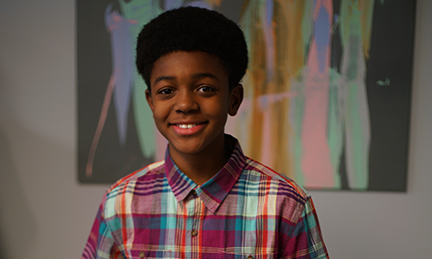
Dear diary,
I’ve got a story for you today, and this one’s not about Trish driving me crazy for once! Well, Trish is in it, and she was driving me crazy, but there’s more to it than that.
So there’s this new horse at Rescue Ranch, Winston. He was a workhorse all his life, and now that he’s getting older he’s gone blind and needs help finding his way around new places. He still has a great sense of smell, but he mostly uses that to find out if there are treats around.
When he first arrived, Trish was “helping” me sweep the barn (if you can call singing and dancing around a pile of hay helping). Grandpa brought Winston in and told us his owner gave him up because he couldn’t work on the farm anymore. I felt so bad for him — just because he can’t do all the things he used to, doesn’t mean he’s useless!
I checked on him later, and Grandpa told me he wasn’t settling in very well. I snapped a couple of pictures, and before I knew it he was right next to me letting me pet him! Grandpa says horses can sense if you’ve got a kind heart and if you do, they’ll make friends with you right away. I felt so special because usually it’s Skye who’s the best at connecting with animals, but Winston chose me!
After Grandpa said that, I wanted to hang out with Winston all the time! I helped feed him and showed him all around the Ranch so he could get comfortable with all the places he can go. Trish and I gave him treats, but she got carried away and started jumping up and down and singing again. I explained to her that Winston likes peace and quiet and that lots of noise and excitement might be fun for her, but they make him nervous. I kind of feel that way sometimes too — I love all my Ponysitter friends, but I also love just being by myself some of the time. Sometimes it feels like I’m out of energy and my batteries need recharging, and drawing or taking pictures or just having some quiet time alone helps charge them right back up. I guess horses are more like people than I thought!
I never thought a horse could teach me a lesson about myself, but Winston has helped me learn that it’s okay to take a little extra time getting comfortable in new situations, and that some people (and horses) need quiet time alone to reset. I’m definitely going to be spending lots more time with Winston in the future — but if sometimes he’s not feeling like it, that’s okay too.
Did you know that kids can become a real member of the Ponysitters Club? Learn how to join and be sure to inspire your kids to be doers by downloading the 4-H Inspire Kids to Do Activity Guide!
And there’s another way to celebrate STEM learning this fall: as one of the top themes for Lights On Afterschool!
As the nation’s only rally for afterschool programs, Lights On Afterschool attracts more than one million Americans to 8,000 events every year. There’s no need to add more to your plate as you plan out your STEM learning celebration: your 4‑H NYSD event counts as a Lights On Afterschool event when you register.
We are so excited to partner with 4‑H and highlight Code Your World as part of our STEM promotion for Lights On Afterschool. As we get closer and closer to October 25, we’re seeing amazing ideas for STEM celebration rolling in. Here are a few highlights:
If you’re celebrating STEM learning in the lives of young people this fall, we hope you’ll register your 4‑H National Youth Science Day event as a Lights On Afterschool event!
Through the 4‑H Tech Changemakers initiative, Microsoft is equipping young people with the knowledge, resources, and empowerment to lead in their communities through technology.
Meet a few of the Tech Changemakers:
The 4‑H club in Quincy, Washington has been gathering data from their peers, parents, teachers and community members to help them determine how they want to pursue digital skills training in their communities.
After compiling the data from over 50 in-person interviews, they discovered a communication gap between students and parents.
“A lot of parents don’t realize what students do every day at school, there’s a disconnect,” said Daisy, a Tech Changemaker.
But it doesn’t have to be this way. The school has an online portal where parents can see how students are doing in each class, monitor if they turned in homework or see if they were absent, but many parents are unable to access the portal. During their interviews, the youth have found many reasons that contribute to this disconnect, from language barriers to lack of internet access.
In January, the team met with community leaders to help determine how best to tackle this problem. With lots of enthusiasm, a team member named Elena remarked, “I’m excited to work with other people in our community to solve this problem, but I’m also really worried about actually executing it!”
Tech Changemakers Paige and Inez have known for months that they want to tackle one of Washington County, Maine’s most significant problems: food insecurity. They hope to use tech and coding to create a website or a digital map that will connect people to healthy and affordable local food. But they won’t be able to do it alone: The first step in their journey is to recruit other passionate young people to help lead their project.
When Computer Science Education Week (CS Ed Week) arrived in December, they were eager to volunteer to run two events in their community. What they weren’t expecting is that CS Ed Week would turn out to be their best recruiting tool!
Paige recalled one peer saying, “I want to sign up for 4‑H if this is what you guys do, this is awesome!“
In addition to introducing over 30 kids to coding, they recruited three additional students interested in becoming part of the core planning team.
Inez said, “The coolest part was that people were so interested in coding they became more interested in our project– because they got a taste of what we can do!”
Virginia 4‑H’ers Mackenzie and Kaitlyn are working to bring youth in their community together through technology. The problem: The consolidation of two schools in their county has caused tension in the community. 4‑H’ers are leading the way by developing a program that focuses on developing leadership, citizenship and communication skills in teens that hopefully leads to increased civic engagement that can help bring kids together.
Currently, they plan on sponsoring a game design challenge that will bring youth together and expose them to a variety of fun technology and computer science activities. They hope to launch afterschool workshops in the spring and day camps in the summer. So far, they’ve received lots of positive feedback from members of their community.
“People were on the same page as us; it was nice to know we were going in the right direction with our project!” Mackenzie said.
This ambitious project is new territory for many of the youth leaders.
“I’m excited because it’s a new topic for me. A lot of what we do here is livestock, and I think it’s really important to try something new and different. I’m just hoping I can catch up (to the kids in TEALS),” said Mackenzie.
The group already has activities planned for the new year to help them get prepared. They are working on a recruitment strategy for high school mentors, a leadership training retreat and a meeting with a professor at Virginia Tech to learn about developing CS games for kids.